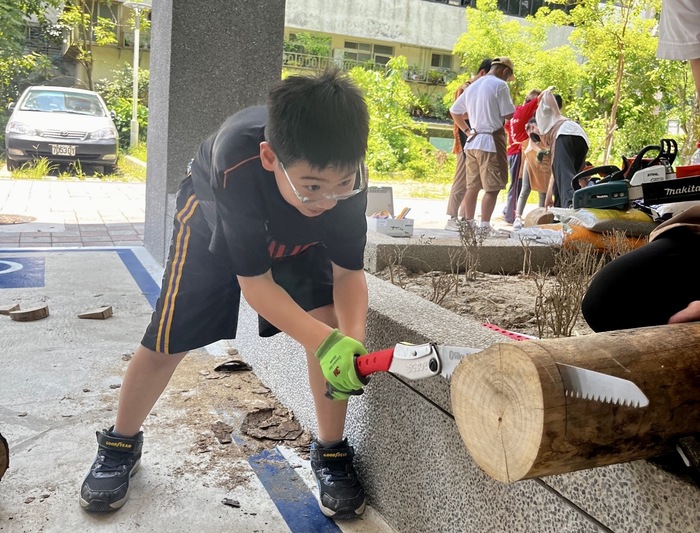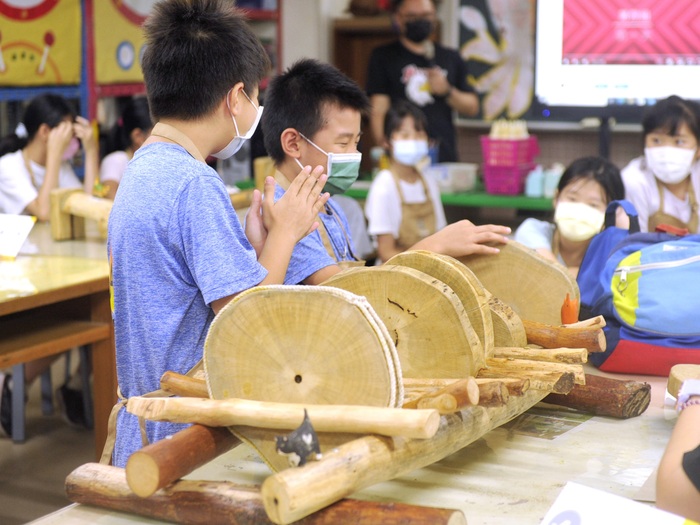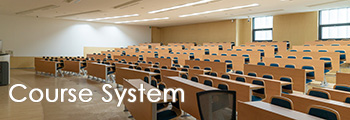Reimagining Resources and Preserving Memories: Taipei Tech Works with Elementary School in Sustainable Woodcraft Camp


In the summer of 2023, due to safety concerns, the Affiliated Experimental Elementary School of National Chengchi University (NCCU) cut down a number of blackboard trees. However, the faculty and students wished for these trees, which had grown alongside the children, to remain a part of the campus in some form. Responding to this, the Taipei Tech USR team, as part of the Wood Culture Rooting Innovation Project II, joined forces with the NCCU Affiliated Elementary School and Learn by Space (LBS), an organization promoting children’s architecture education, in hosting a five-day woodwork summer camp. This camp fostered interdisciplinary and intergenerational collaboration, aiming to advance sustainable woodcraft education.
The theme of the camp centered around the sustainability of forest resources. It started with teaching participating children to understand sustainable forest management and planned thinning. It then transitioned to design thinking, allowing students to observe the campus and brainstorm ideas to repurpose the felled trees. Under the guidance of Taipei Tech woodcraft teachers and teaching assistants, fifteen students learned craftsmanship techniques and developed an awareness of sustainable resource use, including material selection, processing, and creation.
At the camp's conclusion, the students presented their collaborative projects, such as the Wooden Mat. They envisioned the fallen trees as a bench next to the playground, with Wooden Mats fixed onto the tree, providing comfortable seating. Other projects included the Xiaomi Fence for play area safety, the Waiting Parents’ Chairs for parents waiting to pick up their children, bamboo dragonflies, and wooden whistles, all crafted from the school’s own trees.
Guo Zong-de, teacher at the NCCU Affiliated Elementary School, expressed his gratitude for the opportunity to work with Taipei Tech and LBS members. He highlighted the enriching experience of introducing craft education into elementary school and the benefits of engaging students in a five-sense learning process. He found it rewarding to see students interact positively and support each other in the class. Although it is now easy to buy any woodcraft product online, he noted that students’ collaboration and problem-solving experiences from this camp were priceless.
Hao-Jhe Li, the camp leader and USR project manager, who also serves as a lecturer in the Department of Industrial Design at Taipei Tech, stated that "Imagination and creativity are like two parallel lines, and woodworking brings them together.” He hopes that through the efforts of Taipei Tech’s USR team and the engaging power of woodcraft, imaginative ideas can be realized through intergenerational cooperation. In doing so, he believes, we can collectively become sustainability practitioners.
Thomas C.K. Yang, Taipei Tech Vice President and USR Office Deputy Director, remarked that Taipei Tech has been engaged in the Wood Culture Rooting Innovation Project II, funded by the Ministry of Education, for four years. Taipei Tech is committed to collaborating with elementary schools to develop a new generation of woodcraft instructors. The initiative aims to instill woodworking skills in primary education and beyond, fostering creativity and sustainability in young minds for the future.
The theme of the camp centered around the sustainability of forest resources. It started with teaching participating children to understand sustainable forest management and planned thinning. It then transitioned to design thinking, allowing students to observe the campus and brainstorm ideas to repurpose the felled trees. Under the guidance of Taipei Tech woodcraft teachers and teaching assistants, fifteen students learned craftsmanship techniques and developed an awareness of sustainable resource use, including material selection, processing, and creation.
At the camp's conclusion, the students presented their collaborative projects, such as the Wooden Mat. They envisioned the fallen trees as a bench next to the playground, with Wooden Mats fixed onto the tree, providing comfortable seating. Other projects included the Xiaomi Fence for play area safety, the Waiting Parents’ Chairs for parents waiting to pick up their children, bamboo dragonflies, and wooden whistles, all crafted from the school’s own trees.
Guo Zong-de, teacher at the NCCU Affiliated Elementary School, expressed his gratitude for the opportunity to work with Taipei Tech and LBS members. He highlighted the enriching experience of introducing craft education into elementary school and the benefits of engaging students in a five-sense learning process. He found it rewarding to see students interact positively and support each other in the class. Although it is now easy to buy any woodcraft product online, he noted that students’ collaboration and problem-solving experiences from this camp were priceless.
Hao-Jhe Li, the camp leader and USR project manager, who also serves as a lecturer in the Department of Industrial Design at Taipei Tech, stated that "Imagination and creativity are like two parallel lines, and woodworking brings them together.” He hopes that through the efforts of Taipei Tech’s USR team and the engaging power of woodcraft, imaginative ideas can be realized through intergenerational cooperation. In doing so, he believes, we can collectively become sustainability practitioners.
Thomas C.K. Yang, Taipei Tech Vice President and USR Office Deputy Director, remarked that Taipei Tech has been engaged in the Wood Culture Rooting Innovation Project II, funded by the Ministry of Education, for four years. Taipei Tech is committed to collaborating with elementary schools to develop a new generation of woodcraft instructors. The initiative aims to instill woodworking skills in primary education and beyond, fostering creativity and sustainability in young minds for the future.






